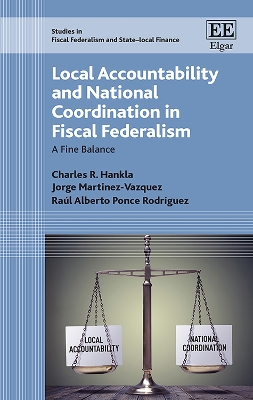Studies in Fiscal Federalism and State-local Finance
1 total work
Local Accountability and National Coordination in Fiscal Federalism
by Charles R. Hankla, Jorge Martinez-Vazquez, and Raul A. Ponce Rodriguez
With this in mind, the authors emphasize the importance of striking a ''fine balance'' between the accountability benefits delivered by empowered local governments and the national coordination necessary for good policy outcomes. Such a balance can be achieved, they contend, when integrated party structures compensate for the potential downsides of a decentralized state. The book formalizes this argument for a variety of electoral democracies and, using new data on subnational political institutions, tests it with models of education, health, and infrastructure service delivery in 135 countries across 30 years. It also presents comparative case studies of Senegal and Nigeria.
Academic economists and political scientists will value the book for its contribution to the literature on fiscal federalism and political decentralization, and development practitioners will benefit from its practical solutions to the problems of local governance.
